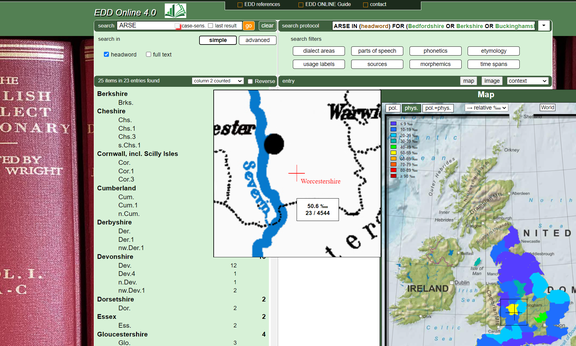Introduction
English Dialect Dictionary Online allows for comprehensive queries on linguistic and cultural items for Late Modern English dialects worldwide. Owing to sophisticated digital data processing, described in some detail below, it is an interface that lifts English dialectology to a new level. It can carry out complex combined and “piggyback” searches for dialectal features, quantify and normalize the query results, and illustrate them on ad hoc maps.
A flexible interface tailored to users' needs
The interface of EDD Online, particularly in its 2023 version 4.0, is a new and unique tool for analyzing English dialects comprehensively. Unlike traditional dialectology, which has mostly focused on individual dialectal features and areas, the algorithms of EDD Online allow for quantification of findings, their rearrangement according to the users’ needs, and foci on diverse linguistic criteria and filters. They encourage mapping of results by areal distribution, and offer access to the original dictionary pages and passages, as well as nested (“piggyback”) searches, with the results of a first search framing another one. The interface, thus, can provide hitherto inaccessible information on dialect words, types of word formation (such as compounds), definitions, citations, and spelling variants. It can also filter the rich material not only according to regional criteria, but also for parts of speech, usage labels, sources, phonetics, etymology, and the time-spans of occurrence of the selected items.
Technical implementation
Technically, the dictionary’s text was modeled using XML and the TEI (‘’Text-Encoding Initiative”) scheme. The data is processed by dint of XPath, XQuery, and the BaseX library. The application provides search-routines for special linguistic needs, e.g. concordance registering. A REST interface allows for the data to be accessed through a frontend employing latest web technologies, for example, HTML5, JavaScript, JSON, and CSS.
Thanks to extensive programming, the application is able to process, for example, fuzzy information, as in the dialect attribution “in some parts of North Riding” or in the temporal classification “20 to 30 years ago”. Our algorithms then “know” that these are statements about dialect use in Yorkshire and the time span 1870-80 respectively. Another example of the “brain” capacity of the query routines is the implemented mechanism of the quantification of search results and the creation of dynamic maps of dialectal distribution based on statistical processing.
Conclusion
EDD Online means a new departure in dialectology. By its comprehensive approach, it provides unique information on Late Modern English dialects, allowing for large-scale comparisons between dialects and delivering survey results that are based on quantification (dialectometry) and statistics. The interface is the result of enduring and patient synergetic teamwork of programmers and philologists.
References (selection of scholarly articles of 2021ff.):
Markus, Manfred, and Monika Kirner-Ludwig. 2024 (in preparation). “A philologist’s perspective on Artificial Intelligence – a case study into English Dialect Dictionary Online 4.0.” International Journal of Linguistics. (submitted and under review)
Markus, Manfred. 2023. “What is new in EDD Online 4.0?”. Dictionaries: Journal of the Dictionary Society of North America 44, 1: 121-140.
Markus, Manfred. 2022. “Phonetic spellings in the Late Modern English dialect of the Isle of Wight.” Journal of Linguistic Geography, online publication first view, 1-12. DOI: 10.1017/jlg.2022.9
Markus, Manfred. 2022. “A critical assessment of English dialect feature catalogues: Towards a dialectometrical evaluation of the English Dialect Dictionary Online.” Lingua, online publication first view 279:1-18. https://doi.org/10.1016/j.lingua.2022.103428.
Markus, Manfred. 2022. “Wright about Wight: a dialect glossary of the Isle of Wight based on EDD Online.” Journal of Linguistic Geography 10,2: 76-86.
Markus, Manfred. 2021. “OED and EDD: comparison of the printed and online versions.” Lexicographica 37: 261-280.
Markus, Manfred. 2021. “Wright’s sources: Compatibility with other filters and parameters in EDD Online 4.0.” Dictionaries. Journal of the Dictionary Society of North America 42,2: 169-190.
Markus, Manfred. 2021. ”‘Dirt‘ in Dialect: Linguistic ubiquity of pollution in EDD Online.” English Today (IF 1.123): 1-16. Online publication. DOI: 10.1017/s0266078421000183
Markus, Manfred. 2021. “Ist Dialekt die Seele der Sprache? ”. Universitas 2021: 76-98.
Markus, Manfred. 2021. “Aphesis and aphaeresis in Late Modern English dialects (based on EDD Online)”. English Studies 102,1: 124-141.
DOI: https://www.doi.org/10.48763/000007
This work is licensed under a Creative Commons Attribution 4.0 International License.
Guest post written by Manfred Markus in October 2023.
Professor Emeritus at the Department of English
University of Innsbruck
About the author
Manfred Markus is Professor Emeritus of English linguistics and mediaeval English literature at the University of Innsbruck. He has published widely, with over 20 books and 120 articles on his record. His last monograph was English Dialect Dictionary Online: A New Departure in English Dialectology (2021, Cambridge University Press). In his research, Markus has focused on contrastive linguistics, historical English, corpus linguistics, and English dialectology. He has compiled several computerized corpora, including the Innsbruck Corpus of Middle English Prose and the Innsbruck Letter Corpus 1386 to 1699.
Research area
English Linguistics



